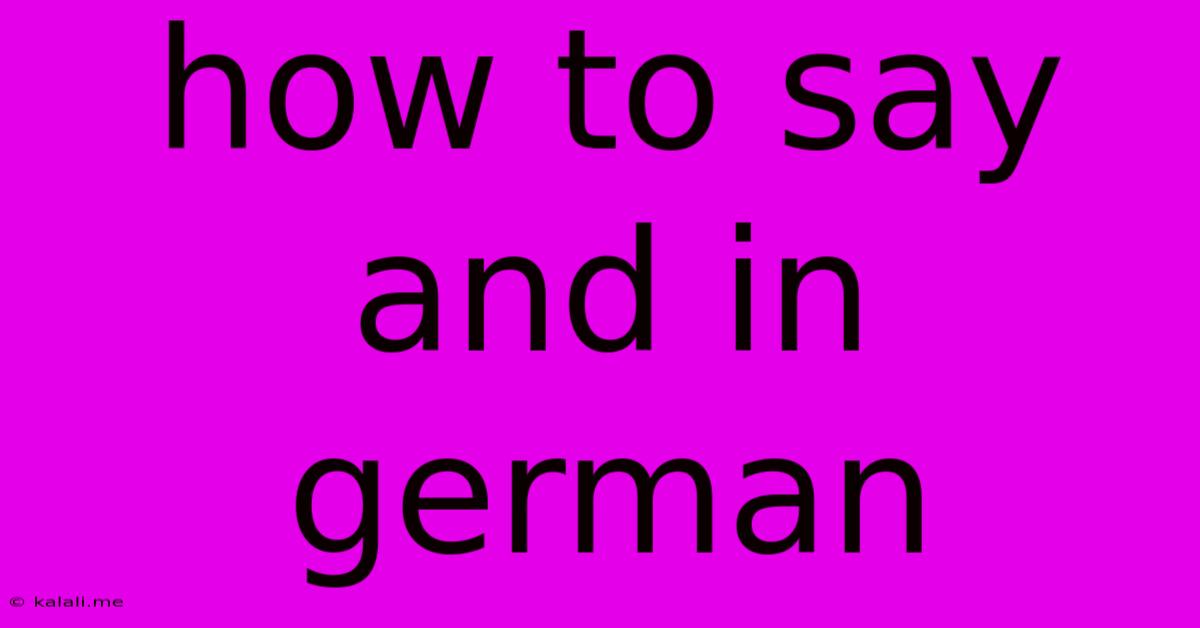How To Say And In German
Kalali
May 25, 2025 · 2 min read

Table of Contents
How to Say "And" in German: A Comprehensive Guide
So you're learning German, and you've hit a snag: how to say "and"? It's not as simple as a direct translation, as German offers several ways to express "and," depending on the context. This comprehensive guide will equip you with the knowledge to use the correct conjunction every time. This article will cover the most common ways to say "and" in German, including their nuances and appropriate usage. Mastering these will significantly enhance your fluency and comprehension of the German language.
The Most Common Ways to Say "And" in German
The most common word for "and" in German is und. This is a versatile conjunction and works in most situations. Think of it as your go-to word for "and" in most sentences.
- Example: Apfel und Birne (Apple and pear)
- Example: Ich mag Kaffee und Tee. (I like coffee and tea.)
However, German offers more sophisticated options depending on the context. Let's delve deeper:
Beyond "Und": Exploring Other Conjunctions
While "und" is your everyday "and," German offers other conjunctions to convey different shades of meaning. These nuances are crucial for natural-sounding German.
-
Sowie: This translates more closely to "as well as" or "in addition to." It's often used to add an extra element or thought.
- Example: Sie studiert Medizin, sowie ihre Schwester. (She studies medicine, as well as her sister.)
-
Auch: Meaning "also" or "too," this word is used when adding something similar or supplementary. It often appears later in the sentence.
- Example: Ich mag Pizza. Ich mag auch Pasta. (I like pizza. I like pasta too.)
-
Und zwar: This translates to "namely" or "specifically" and is used to provide a more precise explanation or detail after mentioning a general idea.
- Example: Ich habe ein neues Haustier, und zwar einen Hund. (I have a new pet, namely a dog.)
-
Nicht nur...sondern auch: This phrase translates to "not only...but also" and highlights a contrast or addition of significance.
- Example: Er ist nicht nur intelligent, sondern auch sehr freundlich. (He is not only intelligent, but also very friendly.)
Choosing the Right "And": Context is Key
Selecting the appropriate conjunction depends entirely on the context of your sentence. Consider the relationship between the elements you're connecting. Are they similar? Do they add a detail? Are they contrasting? Answering these questions will guide you towards the best choice.
Practicing Your "Ands"
The best way to master these different forms of "and" is through practice. Try incorporating them into your daily German conversations and writing exercises. Pay attention to how native speakers use them in various contexts. The more exposure you have, the more natural your use of these conjunctions will become.
By understanding the subtle differences between these conjunctions, your German will not only be grammatically correct, but also sound more natural and fluent. This will improve your overall comprehension and communication skills in the German language. So, go forth and practice your "ands"!
Latest Posts
Latest Posts
-
How To Increase Home Water Pressure
May 27, 2025
-
How Long Does Coconut Milk Last
May 27, 2025
-
How Does A Frog Magnet Work
May 27, 2025
-
Getting Rid Of Water Stains On Wood
May 27, 2025
-
How To Remove Paint Of Wood
May 27, 2025
Related Post
Thank you for visiting our website which covers about How To Say And In German . We hope the information provided has been useful to you. Feel free to contact us if you have any questions or need further assistance. See you next time and don't miss to bookmark.